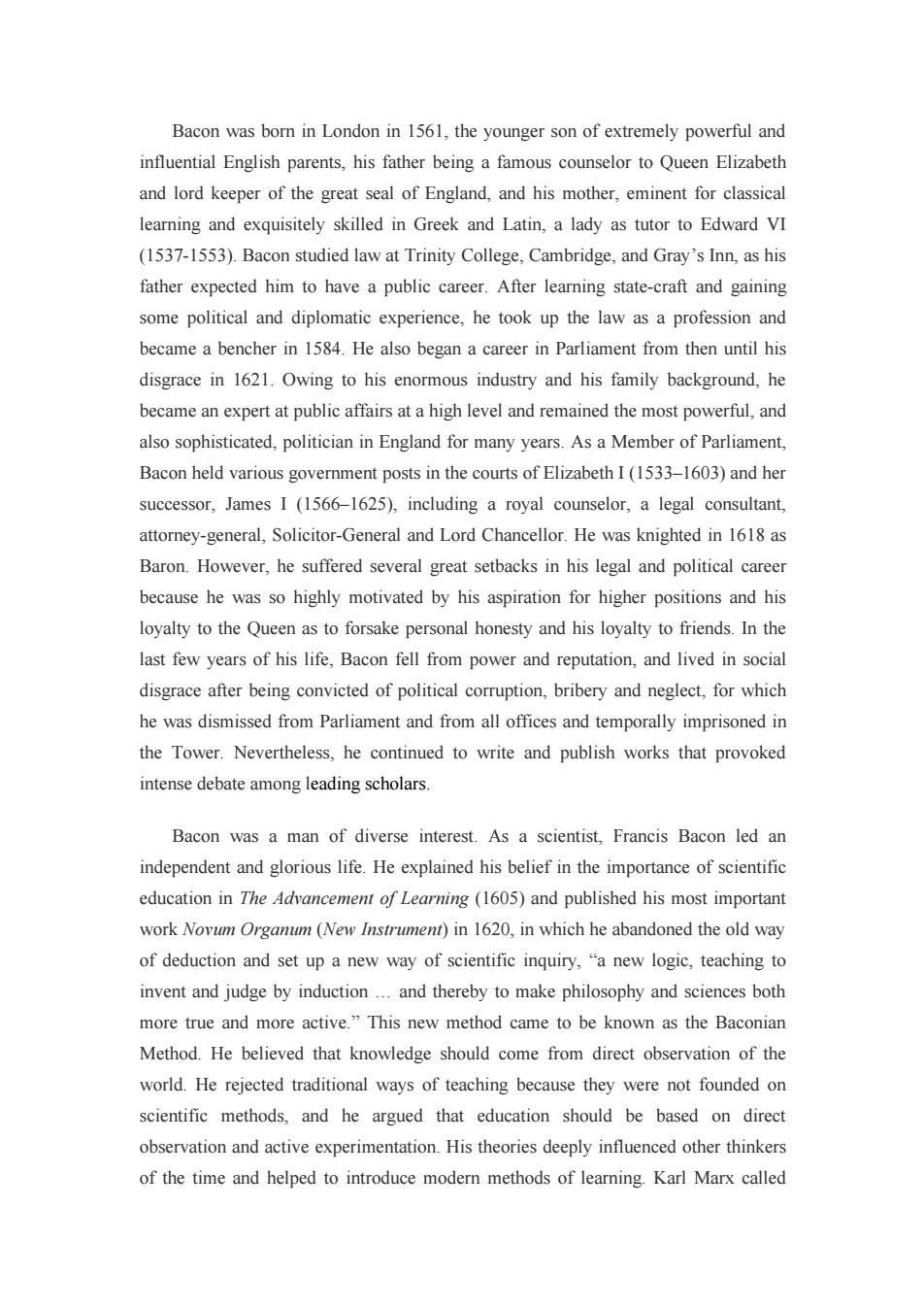正在加载图片...

Bacon was born in London in 1561,the younger son of extremely powerful and influential English parents,his father being a famous counselor to Queen Elizabeth and lord keeper of the great seal of England,and his mother,eminent for classical learning and exquisitely skilled in Greek and Latin,a lady as tutor to Edward VI (1537-1553).Bacon studied law at Trinity College,Cambridge,and Gray's Inn,as his father expected him to have a public career.After learning state-craft and gaining some political and diplomatic experience,he took up the law as a profession and became a bencher in 1584.He also began a career in Parliament from then until his disgrace in 1621.Owing to his enormous industry and his family background,he became an expert at public affairs at a high level and remained the most powerful,and also sophisticated,politician in England for many years.As a Member of Parliament, Bacon held various government posts in the courts of Elizabeth I(1533-1603)and her successor,James I (1566-1625),including a royal counselor,a legal consultant, attorney-general,Solicitor-General and Lord Chancellor.He was knighted in 1618 as Baron.However,he suffered several great setbacks in his legal and political career because he was so highly motivated by his aspiration for higher positions and his loyalty to the Queen as to forsake personal honesty and his loyalty to friends.In the last few years of his life,Bacon fell from power and reputation,and lived in social disgrace after being convicted of political corruption,bribery and neglect,for which he was dismissed from Parliament and from all offices and temporally imprisoned in the Tower.Nevertheless,he continued to write and publish works that provoked intense debate among leading scholars. Bacon was a man of diverse interest.As a scientist,Francis Bacon led an independent and glorious life.He explained his belief in the importance of scientific education in The Advancement of Learning (1605)and published his most important work Novum Organum(New Instrument)in 1620,in which he abandoned the old way of deduction and set up a new way of scientific inquiry,"a new logic,teaching to invent and judge by induction...and thereby to make philosophy and sciences both more true and more active."This new method came to be known as the Baconian Method.He believed that knowledge should come from direct observation of the world.He rejected traditional ways of teaching because they were not founded on scientific methods,and he argued that education should be based on direct observation and active experimentation.His theories deeply influenced other thinkers of the time and helped to introduce modern methods of learning.Karl Marx calledBacon was born in London in 1561, the younger son of extremely powerful and influential English parents, his father being a famous counselor to Queen Elizabeth and lord keeper of the great seal of England, and his mother, eminent for classical learning and exquisitely skilled in Greek and Latin, a lady as tutor to Edward VI (1537-1553). Bacon studied law at Trinity College, Cambridge, and Gray’s Inn, as his father expected him to have a public career. After learning state-craft and gaining some political and diplomatic experience, he took up the law as a profession and became a bencher in 1584. He also began a career in Parliament from then until his disgrace in 1621. Owing to his enormous industry and his family background, he became an expert at public affairs at a high level and remained the most powerful, and also sophisticated, politician in England for many years. As a Member of Parliament, Bacon held various government posts in the courts of Elizabeth I (1533–1603) and her successor, James I (1566–1625), including a royal counselor, a legal consultant, attorney-general, Solicitor-General and Lord Chancellor. He was knighted in 1618 as Baron. However, he suffered several great setbacks in his legal and political career because he was so highly motivated by his aspiration for higher positions and his loyalty to the Queen as to forsake personal honesty and his loyalty to friends. In the last few years of his life, Bacon fell from power and reputation, and lived in social disgrace after being convicted of political corruption, bribery and neglect, for which he was dismissed from Parliament and from all offices and temporally imprisoned in the Tower. Nevertheless, he continued to write and publish works that provoked intense debate among leading scholars. Bacon was a man of diverse interest. As a scientist, Francis Bacon led an independent and glorious life. He explained his belief in the importance of scientific education in The Advancement of Learning (1605) and published his most important work Novum Organum (New Instrument) in 1620, in which he abandoned the old way of deduction and set up a new way of scientific inquiry, “a new logic, teaching to invent and judge by induction … and thereby to make philosophy and sciences both more true and more active.” This new method came to be known as the Baconian Method. He believed that knowledge should come from direct observation of the world. He rejected traditional ways of teaching because they were not founded on scientific methods, and he argued that education should be based on direct observation and active experimentation. His theories deeply influenced other thinkers of the time and helped to introduce modern methods of learning. Karl Marx called